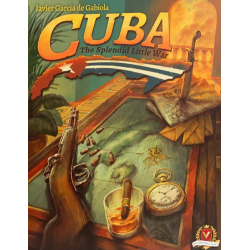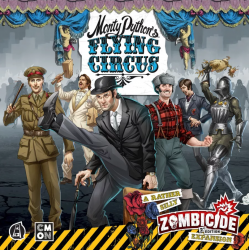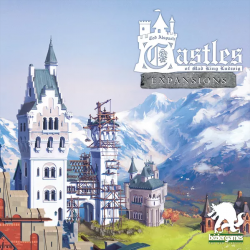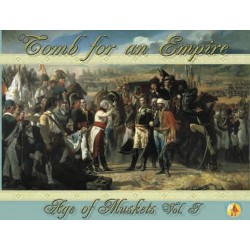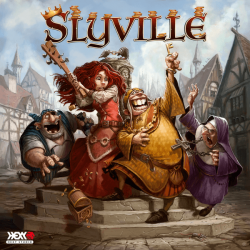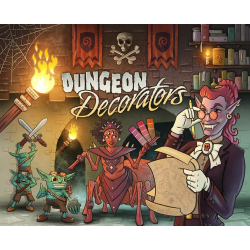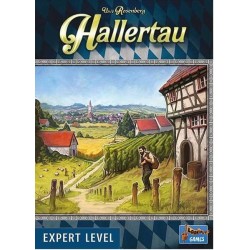No products in the cart.
Active filters
Zombicide: 2nd Edition – Monty Python's Flying Circus: A Rather Silly Expansion
Cuba: The Splendid Little War
Cuba: The Splendid Little War, from designer Javier Garcia de Gabiola, is a two-player simulation of the third War of Cuban Independence, which lasted from 1895 to 1898. (This was the last of the three liberation wars fought between Cuba and Spain; the previous wars were the Ten Years\' War (1868-1878) and the Little War (1879-1880). One player controls the forces of the Spanish colonial government, fighting to retain Cuba; the other player controls the Cuban rebels fighting for their independence.
Zombicide: 2nd Edition – Monty Python's Flying Circus: A Rather Silly Expansion
And now for something completely different.
The zombie invasion is about to get very silly indeed with the introduction of the Monty Python’s Flying Circus expansion for Zombicide 2nd Edition! Some of the most nonsensical creations from the classic TV show by the revered English comedy troupe are being brought to the tabletop through amazing miniatures and irreverent gameplay.
Healthy Heart Hospital (Third Edition)
Healthy Heart Hospital is a cooperative hospital game, where every patient is counted in dollars. Every game is different with a variety of doctors, nurses, and hospital administrators to choose from. Healthy Heart Hospital is easy to learn and features exciting cube-based gameplay. You will be dying to see each cube!
Castles of Mad King Ludwig: Expansions
In Castles of Mad King Ludwig, you built the perfect castles subject to the whims of the King. But now he wants even more (he is mad, after all). Castles of Mad King Ludwig: Expansions contains several expansions that can be played separately or in any combination, as well as brand new bonus cards and favors.
Age of Muskets Volume I: Tomb for an Empire
Age of Muskets is a rule set that covers the campaigns from the late XVII century to the first half of the XIX. It emphasizes Command and Control as well as the uncertainty and friction of any military operation. Players take command of an army of the period, represented by their headquarters, and control their attached units, their men and equipment. The purpose is to re-create all the relevant factors of war at the operational level in the pre-industrial age.
Slyville
Medieval cities were home to very different types of people. Not only pious monks, humble scholars and trustworthy merchants, but also those mischievous, cunning and dishonest. In Slyville, a board game of bluff and deceit, you become one of the latter kind. As head of a guild operating in one of the world\'s major trade and cultural centers of the Middle Ages, you will be sending your trusted right-hand men to various districts of the city to find trade bargains, make deals, and provide the organization with more power and wealth — not always in a way that is completely legal, but for sure fun and entertaining!
Dungeon Decorators
From time beyond memory, a great evil overlord has plagued the land, his ruthless cruelty matched only by his ruthlessly poor decorating taste. That evil overlord has died, and numerous pretenders are vying to take over his throne. And everyone knows that the first step on the journey to becoming a legendary evil boss is to set up a nefarious lair.
Hallertau
Take a step into the world\'s biggest contiguous hop-growing region, Hallertau. A strategy game by Uwe Rosenberg where players are leaders of a small town, attempting to improve the craft workshops and to raise the town\'s wealth by growing hops.
The Shipwreck Arcana
The Shipwreck Arcana is a compact, co-operative game of deduction, evaluation, and logic. Each player\'s doom constantly changes as they draw numbered fate tiles from the bag. By choosing which fate to give up and which card to play it on, you can give your allies enough information to identify the fate you\'re holding...which is important, as the active player cannot communicate with their allies during their turn!
Pax Pamir: Second Edition
In Pax Pamir, players assume the role of nineteenth century Afghan leaders attempting to forge a new state after the collapse of the Durrani Empire. Western histories often call this period "The Great Game" because of the role played by the Europeans who attempted to use central Asia as a theater for their own rivalries. In this game, those empires are viewed strictly from the perspective of the Afghans who sought to manipulate the interloping ferengi (foreigners) for their own purposes.

